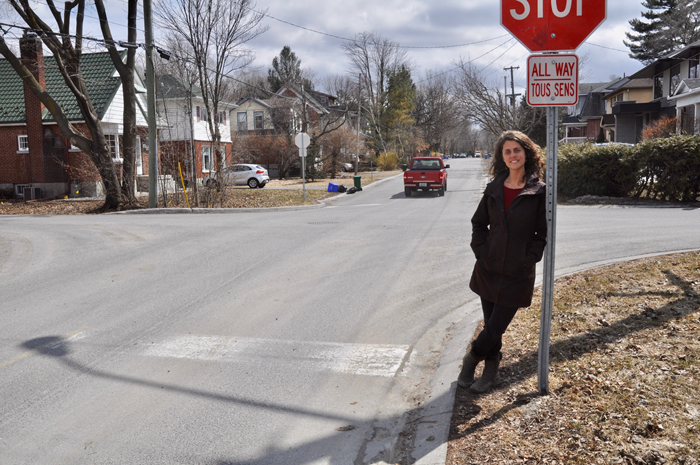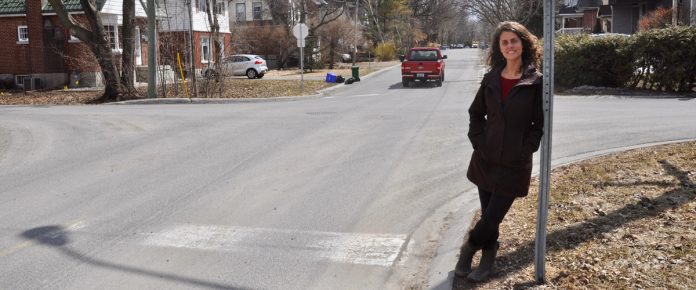By Andrea Tomkins –
It was a discussion on a Facebook group that originally brought Tweedsmuir resident, Gesa Harmston, together with a few of her neighbours – Catherine Rossiter, Rebecca McPhee Irwin, Krista Charbonneau – to finally do something about the speeding cars on their quiet residential street in Westboro.
Gesa, who first moved into her new home in March 2012, lives on Tweedsmuir, a stone’s throw from Byron Avenue. “It’s unbelievable how fast people drive,” says Gesa. “We have kids. I do not feel comfortable having our kids play on the street. I even had a woman come so fast around the corner she came up on our front lawn with her car.”
Contributing to this, as well, is also the lack of sidewalks on Tweedsmuir.
50km/h is the speed limit on most residential roads. “It’s insane,” says Gesa. “When you’re on the street, even 35-40 feels so fast when you’re with your kids.”
In 2015, Gesa and her neighbours met with Councillor Jeff Leiper. The group came prepared with a list of traffic calming suggestions such as speed bumps and planters. Leiper suggested the group talk to other Tweedsmuir residents about lowering the residential speed limit from 50km/h to 40.
“He urged us to go door-to-door and get that 66 per cent because he knew that would be successful,” says Gesa.
The 66 per cent refers to the City of Ottawa’s requirement to come to a consensus as a street, which must be confirmed via an official petition process. “At that point we were only requesting 40km/h. Then life got in the way, as it does for busy parents,” laughs Gesa, whose children are now five and three years of age.

The group spent a few months knocking on doors and talking to fellow residents on Tweedsmuir, which stretches from Scott Street past Dovercourt. About a year later, Tom Pechloff from the Councillor’s office circled back. By that time, in April 2017, Ottawa City Council approved a motion to allow speed limits on some residential roads to be reduced to 30 km/h. She brought the suggestion back to her group and asked for support getting the signatures they needed. This time, however, the proposed 30 km/h speed limit would only be in effect on Tweedsmuir between Byron and Currell.
Knocking on doors is no easy task. As busy parents, the group found it hard to find the time to devote to this initiative. Gesa describes it as their biggest challenge. The group split up the blocks and took about a year to get the signatures they needed.
There were 162 houses to petition and according to Gesa, only “three or four” residents did not want a reduced speed limit. One of the reasons given included a fear of increased police presence in the neighbourhood. On the whole, however, the reaction was overwhelmingly positive.
“Most people were so thrilled, just so grateful that we were coming door to door,” she says.
This past March, the group got the 66 per cent approval needed to take it to the City. From there it was a quick turnaround. The City agreed to change the speed limit and install signage, which should be installed in about a month. (It takes 6-8 weeks after official approval and the group has been warned there may be a backlog.)
The campaign to lower the speed limit was a lot of work but Gesa says it was worth the effort.
“Jeff Leiper and his team were very supportive,” she says. “I do believe in our system a bit more…. This is what we could achieve, so we went for it. It’s worth it.”
[wpvideo smgbaxHP]
Gary Ludington, who has lived on Tweedsmuir for the past 34 years and is a member of the Westboro Community Association, says enforcement is the biggest challenge.
“The major problem is the diminishing staff in the traffic section of the Ottawa Police which results in the lack of enforcement,” says Gary. “When the infrastructure was done between Clare and Byron, the street was narrowed with parking on one side which was meant to help reduce the speed. That hasn’t worked. The four-way stop at Clare is a launching pad to see how long it takes to get to Wesley or Dovercourt. Both are long sections and depending on the time of day are like a racetrack.”
“The best temporary solution I have seen is garbage day when people have to stop for the garbage truck and parked cars.”
In the meantime, Gesa is already fielding questions from other people who want to petition their own street. She hopes that her group’s actions inspire other Ottawa residents to poll their neighbours and request a speed reduction.
[polldaddy poll=10004164]
